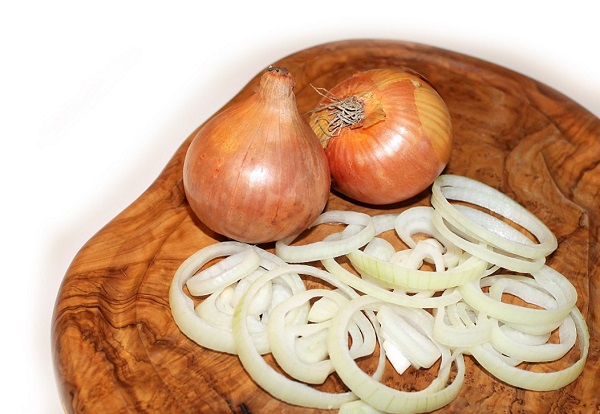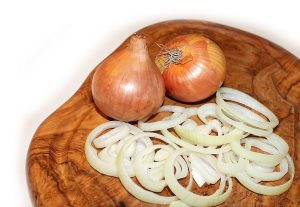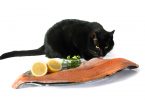Onions are one of the most popular accompaniments to meat dishes around the globe and as famous meat lovers themselves, it is often asked ‘can cats eat onions? ’ Whether you wish to give them a little of your left over Bolognese or are making special little meaty treat for your cat, it is important to know how cats will react to onion in their food and whether it is beneficial or indeed harmful.
Sulphur compounds found in Onions
When looking upon an onion, you may figure that an onion is simply an onion, homegrown without any toxins or odd ingredients. Onions do not come with an ingredient label and not much is known about this food other than the taste and texture. Offering onions to any animal is tricky, since most animals should not eat onions for one reason or another.
Cats may not find the aroma of an onion very appealing and should not seek out the onion on their own free will. If you wish to feed onion to your cat, or your cat has shown an interest in onions, look into the compounds found in onions and put a bit of research into how the compounds interact with the body of your cat. Also be sure to talk to your vet and have a strong recommendation one way or the other.
Can cats eat onions?
The short answer in NO.
Onions are not toxic to people, but are toxic to animals. Cats should not ingest onions, or any food that has come into contact with onions, due to the high level of toxicity. The disulfide concentration is the main culprit when rating the toxicity of onions. The level of which will depend on the level of sulphur in the soil in which they are grown. This is augmented by sulphur dioxide found in the atmosphere due to the burning of fossil fuels. Therefore onions grown near large urban sprawls will inevitably have an increase in sulphur compounds.
Onion, it turns out, are even more toxic to cats than their canine counterparts so the onion should never be given to your cat-even when cooked.
The side effects of a cat eating onion can be wide ranging from gastrointestinal upset, Heinz vomiting, breakdown of red blood cells ( hemolytic anemia, Heinz body anemia), weakness, panting, and blood in urine. Onions can also cause death. Onions can indeed be lethally toxic, so if you think your cat has ingested some, it is important to seek veterinarian attention immediately. If your cat has eaten onion and you notice these odd behaviors, take your cat to the vet right away to be examined. If your cat is not displaying these symptoms, you should still call your vet for advice.
Onions contain thiosulpate, which is toxic to both cats and dogs. They also contain glutathione, which plays an important role in the protection against damage due to excessive oxidation of the blood and circulatory systems.
Hematologic changes have been diagnosed in cats that have ingested as little as two grams per pound body weight. Toxicosis has consistently been observed in pets that have ingested little more than 0.5% of their body weight in one sitting.
Your cat may have elevated heart rate and breathing patterns maybe erratic. Mucous membrane can turn pale and a tell tale sign is a dark red tinge to their urine.
Oxidative damage
Cats are extremely susceptible to this illness (up to two to three times that of other animals), the denaturation of hemoglobin being a particular worry. If your cat has any history of anemia, regardless of severity, the numbers of Heinz bodies, which are found in feline erythrocytes, are often small and your veterinarian may wish to conduct tests and consider further treatment to avoid complications.
Heinz bodies are small round inclusions within the red cell body formed by damage to the hemoglobin component molecules through oxidant damage. They can reduce the red blood cell survival time, leave red blood cells open to damage and have other undesirable effects in cats which can leave your pet vulnerable to circulatory problems.
Most common sources and risks
Wild onions can be found in many parts of the country and although not originally a wild plant, they have found their way from domesticated patches into the countryside around the world and a roaming cat may stumble across some growing by the side of a field in early spring.
If you have a garden, be sure to fence the garden area as best as possible to discourage any cats from stealing your potentially deadly vegetables. A cat does not usually go for onions, but you may have a curious cat, eager to dig up an onion and give it a try. Keep an eye on the onions you have planted and be sure your neighborhood animals leave them alone.
A more common problem maybe encountered if you have a dog that likes to get into the garbage and leave a trail of kitchen waste in the kitchen or garden. Cats are also known to get into the trash on occasion and hunt for any edible leftovers. It is also important to try to clean off your plate after dinner, but when you put the onion into the trash can, you may need to physically remove the trash from the home.
While your cat may not wish to eat a raw onion, they may think quite differently if they find the remnants of a meaty pasta sauce or hearty stew sitting on the kitchen counter or in the trash can.
Treatment
As severe onion toxicosis can be lethal, it is very import to spot the signs early and take the necessary steps to ensure that your cat can recover as soon as possible.
First of all, and hopefully this will be instinctive, remove the source immediately and dispose it safely so no other pets can gain access to it.
Vomiting should be induced; this can be achieved administering three percent hydrogen peroxide (not the type to color hair) orally. Adding to a treat you know your cat will eat. If this fails, oral syringing may be necessary. Dose should be 1 milliliter per pound body weight. Vomiting may not be your favorite aspect of pet health care, but the act of vomiting removes the potentially deadly poison from the body of your cat.
Treatment can also involve a change of diet with certain proteins and amino acids shown to have a significant effect on glutathione synthesis. Dietary imbalances in cats are of particular importance; a lack of taurine and/or anorexia can affect glutathione metabolism.
Conclusion
So when it comes to the question can cats eat onions? It is quite clear. Onions must be avoided under all circumstances. Whether raw in the countryside or in the last piece of last night’s lasagna, do not take the lead from Garfield. Put it back in the fridge to reheat for your own snack later.
References:
http://www.petmd.com/cat/emergency/poisoning-toxicity/e_ct_human_food_poisoning
http://pets.webmd.com/cats/ss/slideshow-foods-your-cat-should-never-eat
http://www.aspca.org/pet-care/animal-poison-control/people-foods-avoid-feeding-your-pets









Leave a Comment